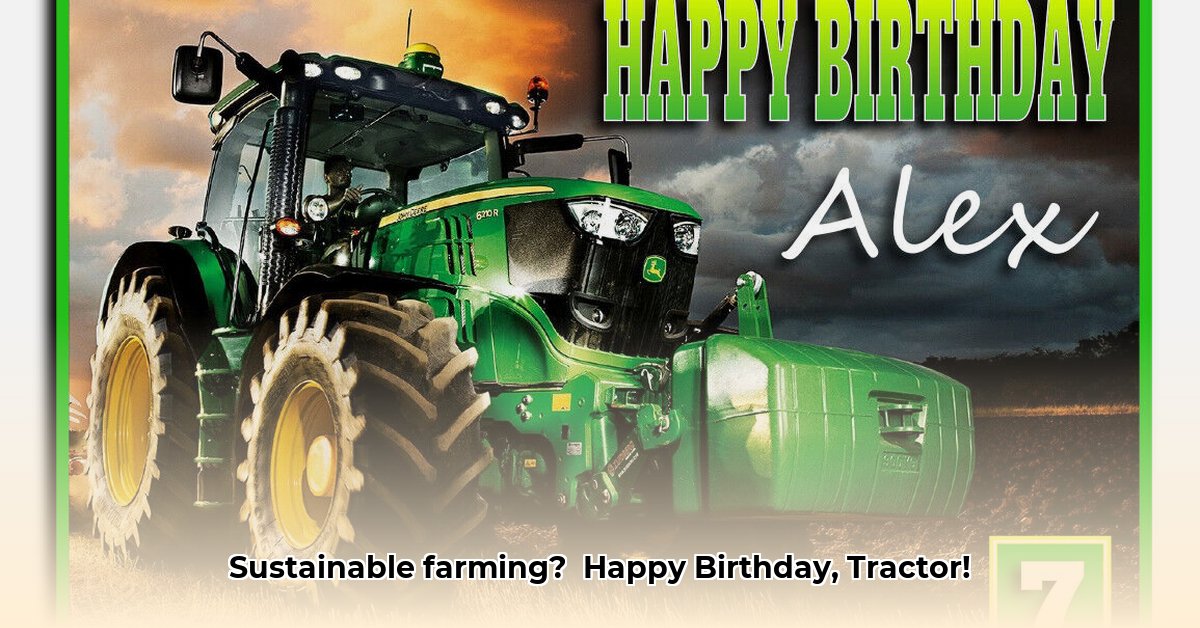
A Surprisingly Green Toy Market
The seemingly disparate worlds of collectible toy tractors and sustainable agriculture converge in an intriguing way. The ERTL Farmall 706, a popular collectible, exemplifies this connection. See more tractor birthday images for inspiration. An Amazon search for "tractor birthday" yields over 6,000 results, revealing a substantial market for these miniature farm machines. This indicates more than mere childhood nostalgia; it suggests a broader public interest in agriculture and its future, potentially extending to sustainable practices. But can a toy tractor truly offer insights into environmentally conscious farming? This article explores that very question.
Market Analysis: More Than Just Childhood Memories
The ERTL Farmall 706's popularity provides valuable insights into consumer preferences. Its detailed die-cast construction and accurate representation demonstrate a demand for authenticity. Consumers appreciate the meticulous detail, reflecting a potential interest in the complexities of modern agriculture. This preference for realism suggests a receptive audience for educational initiatives promoting sustainable farming techniques. However, current data lacks crucial information on the environmental impact of producing these toys. Specifically, data on manufacturing processes, materials used, and the overall carbon footprint are needed for a complete market analysis. Sales data, including pricing trends and sales volume over time, would further enhance understanding of market dynamics.
(Figure 1: Amazon Search Trend Data would be placed here – showing a bar graph illustrating search volume over time for "tractor birthday" and related keywords. Data source needed.)
Sustainability Implications: Thinking Big, Starting Small
The toy tractor market presents an unparalleled opportunity to advocate for sustainable agriculture. Imagine toy tractors made from recycled materials or featuring sustainable farming techniques depicted on their packaging or themselves. Educational campaigns could be launched alongside new toy releases, subtly weaving environmental responsibility into children's play. Collaborative efforts between toy manufacturers and agricultural organizations could create educational toys that promote sustainable practices.
However, several challenges must be considered. Negative public perception of the toy industry's environmental impact could hinder such initiatives. Transparency in manufacturing processes is crucial to build consumer trust and overcome potential skepticism. Effective marketing campaigns are needed to raise awareness around sustainable farming practices.
Actionable Insights: A Collaborative Approach
To achieve meaningful progress, a collaborative effort among various stakeholders is essential. The following table outlines actionable steps for toy manufacturers, agricultural organizations, farmers, and consumers:
| Stakeholder | Short-Term Steps | Long-Term Vision |
|---|---|---|
| Toy Manufacturers | Explore sustainable materials; transparent production details | Develop educational toys promoting sustainable practices and farming technology |
| Agricultural Organizations | Partner with toy companies for collaborative projects | Integrate toys into educational programs; sponsor relevant events |
| Farmers & Ag Businesses | Utilize toys in marketing; offer farm tours | Develop themed events combining sustainable agriculture and collectible toys |
| Consumers | Purchase sustainable toys; support ethical farming practices | Demand transparency; advocate for eco-friendly manufacturing practices |
Risk Assessment & Mitigation: Addressing Potential Challenges
Potential challenges and mitigation strategies are outlined below:
| Risk Factor | Likelihood | Impact | Mitigation Strategy |
|---|---|---|---|
| Negative public opinion of toy production | Moderately Likely | Moderately Significant | Transparency in sourcing and manufacturing; use of recycled materials; highlighting sustainability efforts |
| Low consumer awareness about sustainable farming | Very Likely | Moderately Significant | Targeted marketing campaigns emphasizing the connection between toys and environmental responsibility |
| Marketing challenges | Moderately Likely | Minor | Thorough market research; strategic marketing strategies |
| Scaling up sustainable processes | Likely | Significant | Collaboration with suppliers; investment in efficient, eco-friendly technologies |
Regulatory Considerations: Compliance and Best Practices
Producing sustainable toys requires adherence to relevant safety, material, and labeling regulations. The use of novel, eco-friendly materials may necessitate additional testing and certification. Marketing campaigns must comply with advertising laws and regulations.
Conclusion: Planting Seeds of Change
The popularity of collectible toy tractors, particularly the ERTL Farmall 706, presents a powerful opportunity to engage the public with sustainable agriculture. By addressing the identified data gaps and implementing the proposed strategies, we can leverage this seemingly niche market to foster greater awareness and appreciation for responsible farming practices. Future research should focus on consumer behavior, sales data, and the comprehensive environmental impact assessment of toy production. The journey towards a more sustainable future may, surprisingly, begin with a simple toy tractor.